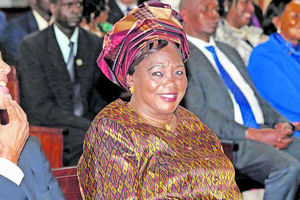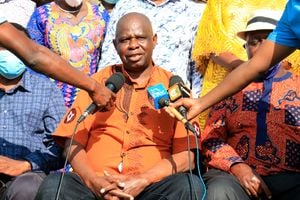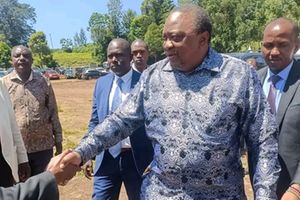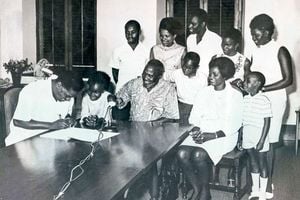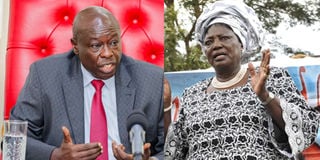
Deputy President Rigathi Gachagua and former First Lady Mama Ngina Kenyatta. Mr Gachagua apologised to the former First Lady for what he called "political madness".
The reason an excerpt of a speech by Kenya’s second President Daniel arap Moi is an internet staple is that it captured him doing something politicians are not very famous for — apologising.
“Kama iko mtu ametukana mimi, namsamehe. Na kama yuko mtu ambaye nimesema chochote ambacho kimeumiza roho yake, nisamehe (If anyone has insulted me, I forgive them. And if there is a person whose heart has been hurt by anything I have said, forgive me),” he said in his last Jamhuri Day speech in 2002, even though critics said it was not an apology for atrocities committed in 24 years of his rule.
And so, when Deputy President Rigathi Gachagua asked for forgiveness from former First Lady Mama Ngina Kenyatta last week for dragging her name into the 2022 General Election politics, the rarity of the gesture was sure to be front-page news.
“She is our mother. I therefore ask for forgiveness on behalf of our team for any inconvenience caused to her. I will never allow anyone to demean her or anyone from the region,” he said.
Mr Gachagua’s words flipped open the book of apologies in politics, which is relatively shallow in Kenya, and sometimes considered insincere.
The year is 2015. President Uhuru Kenyatta, in a state-of-the-nation address, apologises for atrocities meted against Kenyans by previous governments. This covers the 2007-2008 post-election violence, the Wagalla massacre, the Nyayo House torture chambers and unresolved assassinations.
Jump to 2021. Mr Kenyatta apologises for excesses of the police when enforcing Covid-19 containment measures.
December 2022. President William Ruto apologises to Mr Francis Atwoli, the secretary general of the Central Organisation of Trade Unions, saying he said things he should not have said to an elder as they traded words prior to the General Election.
Fast-forward to May 2023. President William Ruto owns up to government failures leading to the death of more than 400 people at the hands of a cult in Shakahola, Kilifi County.
October 2023. Some residents in Gatundu South apologise to Uhuru Kenyatta on his 62nd birthday, saying they regret not heeding to his advice ahead of the 2022 polls.
The list of international apologies is longer, and it involves even entire countries registering remorse for previous actions, for instance Poland that, in 2018, issued a public apology for an anti-Semitic purge in 1968.
In 2019, South Africa apologised to Nigeria for xenophobic attacks against the west African country’s citizens while in 2013, Britain apologised to the Mau Mau for colonial atrocities.
Apologies also involve institutions, and according to a record by Columbia University, some of the bodies that have apologised include the Catholic Church (child sex abuse), auto manufacturer Mercedes-Benz (for controversy involving the Dalai Lama in 2018), among others.
Mr Gachagua’s apology, according to political analyst Herman Manyora, is based on a genuine desire to bring together the people of Mt Kenya. “The Kenyatta family should accept this apology as part of the effort to unite the people of Mt Kenya,” he told the Sunday Nation.
When we asked her to place a context to Mr Gachagua’s move, political analyst Winnie Mitullah said the DP was simply responding to current political demands.
“Whichever way one would like — hate it or like it — the Kenyatta family is an equation in the mountain region. And in history, we don’t throw people who have been in leadership (under the bus),” she said.
She added: “Apology is something very honourable, but I think in politics, apology has two sides: one where it serves to relieve you of what you are facing at that particular moment, but there is also a genuine apology that is just individual-driven or based on principles on what you think is right or wrong. There is a third one which is basically looking at the public and how it is reacting to a particular political output that a system has put out there, thinking that they are implementing or what they've done and the reaction is looking very negative and, therefore, there is a retreat.”
Prof Mitullah says a good example of a sincere political apology was by India’s Prime Minister Narendra Modi when he beat a retreat over three laws that sought to regulate farming.
“It was not just an apology; he apologised and withdrew the laws. I think that was very powerful,” said Prof Mitullah.
According to a post on the website of Columbia University’s Institute for the Study of Human Rights, apologies have the power to rewrite the course of history.
“Political apologies can be a powerful tool in the re-examination of a nation’s history, and the significance this history has on democratic processes,” the institution writes.
Like the Atwoli-Ruto apology, a number of political apologies in Kenya have been related to transitions from one president to another, as officials in one government sought to mend relationships damaged during the transfer of power. “Transitions are always abrasive. And there are usually debates whether presidents should really align themselves (with one of the presidential hopefuls) like Uhuru aligned himself,” said Prof Mitullah.
“When a person like Gachagua now has the confidence to apologise, they are beginning to be statesmen, which they were not at the beginning of taking over the administration. There were more of party politicians,” said Prof Mitullah. “But once you get into the State, you cease to be party line. You become a statesman and stateswoman who is taking care of the entire nation.”
Given the slippery nature of politicians, she says those targeted by the apologies often take them with a pinch of salt.
Public Service Cabinet Secretary Moses Kuria, while borrowing a leaf from Mr Gachagua, last week tweeted an apology to all Kenyans “from all communities”.
“Even when apologies achieve desired effects, the recipients never believe them. Take the (2015) TJRC apology of Uhuru, if people ended up being cushioned (financially) like he said, then people would believe it.”

